In an era where electric vehicles are gaining popularity and momentum in the automotive industry, luxury carmaker Porsche’s recent decision to hold on to gas-powered cars for a little longer has stirred significant interest and discussion among industry experts and enthusiasts alike.
Porsche, known for its high-performance sports cars and luxury vehicles, has built a reputation for precision engineering and driving excellence over the years. With the growing global emphasis on sustainability and environmental consciousness, many had expected Porsche to gradually shift its focus towards electrification.
However, the company’s CEO, Oliver Blume, made it clear that Porsche intends to continue producing gas-powered vehicles alongside its electric models for the foreseeable future. This decision has raised eyebrows and sparked debate within the automotive community, with some questioning the rationale behind maintaining gas-powered cars in Porsche’s lineup.
One of the key factors behind Porsche’s decision could be its loyal customer base, many of whom have a deep appreciation for the brand’s traditional values and the visceral experience offered by gas-powered vehicles. For many enthusiasts, the growl of a powerful combustion engine and the thrill of driving a high-performance sports car are intrinsic to the Porsche experience.
Furthermore, Porsche’s commitment to innovation and technological advancement is not limited to electric propulsion. The company has been actively exploring alternative fuels, synthetic e-fuels, and other sustainable solutions to reduce the environmental impact of its gas-powered vehicles. By investing in research and development in these areas, Porsche aims to strike a balance between performance, sustainability, and heritage.
Moreover, Porsche’s decision to continue producing gas-powered cars could also be driven by market demand and regulatory considerations. While electric vehicles are gaining traction, there is still a significant segment of consumers who prefer the range, convenience, and performance characteristics of gas-powered cars. By catering to diverse customer preferences, Porsche can maintain its competitive edge in the luxury automotive market.
Overall, Porsche’s decision to hold on to gas-powered cars for a bit longer reflects a nuanced approach to product strategy that takes into account customer preferences, technological innovation, and sustainability objectives. As the automotive industry continues to evolve, it will be interesting to see how Porsche navigates the shifting landscape and balances tradition with the demands of the future.
